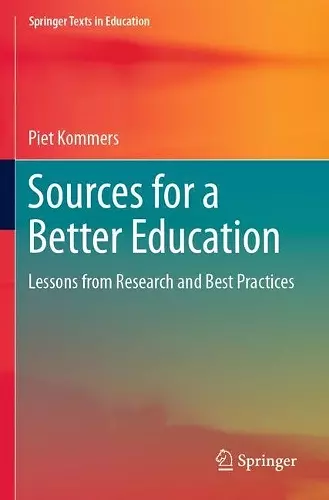Sources for a Better Education
Lessons from Research and Best Practices
Format:Paperback
Publisher:Springer Nature Switzerland AG
Published:25th Feb '23
Should be back in stock very soon
This paperback is available in another edition too:
- Hardback£99.99(9783030889029)

This textbook evolves from the intersection between ‘Research’, ‘Educational Information Technologies’ and recent ‘Best Practices’. It offers diplomacy and erudite rhetoric in order to harvest from innovation projects and see how new professional needs for teachers are emerging day by day. The volume launches the compact background for the 21st century education that every teacher faces after being in charge for 3 or 6 years after pre-service training. ‘Sources for a better education’ refers to the deep understanding and to the incentives for encouraging teachers to leave the comfort zone and experiment the next steps into a further sophisticated professionalism, without the threat of feeling in a ‘Dilemma’.
The first candidate for extending one’s teaching effectiveness is to tailor one’s teaching to the test to be expected. ‘Teaching to the Test’ is an understandable tactic, however it endangers the students’ full understanding of underlying concepts and analogies. The second candidate for professionalism is the deeper layer of knowledge on how curricular domains are related. In simpler terms: better teachers know how to ‘bridge’ topics and subjects so that students develop a deeper understanding on the patterns and structure in knowledge. The 21st century education prioritizes higher degrees of flexible-, divergent and abstract thinking, so that creative problem solving comes into reach. ICT tools for making prior knowledge explicit is a major example on how learners harvest upon prior knowledge, thinking and intuition. The third source for a better education is the courage to envisage one’s meta knowledge in order to see patterns in learning and understanding. The more conscious prior knowledge gets decompiled into genetic metaphors; the better future learning can be anticipated. The fourth asset for meta-cognitive skills is the wide spectrum of tools that the web offers for building knowledge infra-structures so that knowledge becomes transformed into problem solving skills; the availability of knowledge is no longer sufficient for finding creative and authentic solutions in future situations. This is the case for both students and teachers. By tradition, the bottom-up strategy from reproductive factual learning up to the levels of problem solving and creative thinking has been favoured. The ‘one-click away’ access to information on the web asks a more strategic attitude from learners and practitioners to cope with the periphery between known and...ISBN: 9783030889050
Dimensions: unknown
Weight: unknown
573 pages
2022 ed.